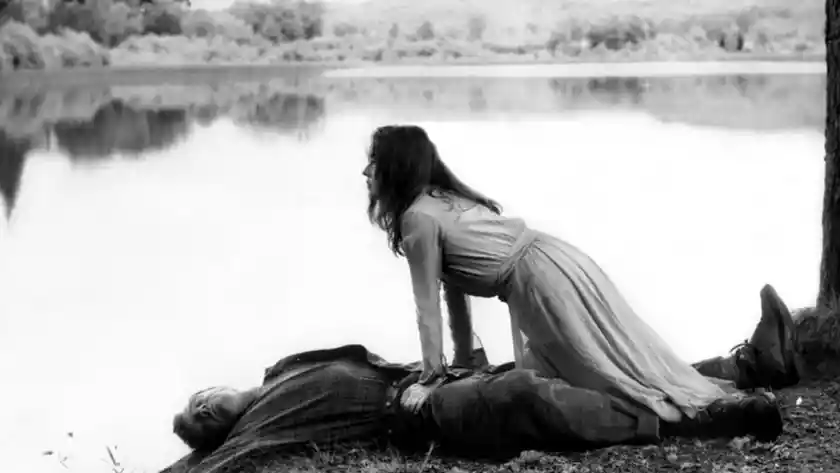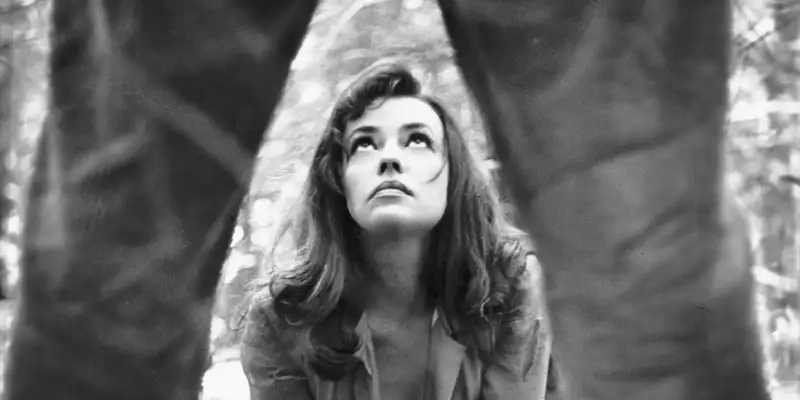Mademoiselle (1966) presents a post-war European village as a petri dish of prejudice, pleasure, and destruction, watched by the local school teacher.
Mademoiselle (1966) begins with a woman opening a sluice gate, and deliberately flooding part of a farm. This woman is the titular mademoiselle (Jeanne Moreau), and this flooding is not the first homespun disaster that she has enacted upon her surrounding village, nor will it be the last. Because, obviously, the local firestarter is also the school teacher. Who else was it going to be – a farmer, the postie? Doubtful.
If the villagers could see what we do, not only would they immediately have their culprit, but they would also know when she was next to strike. For, much like the varied chocolate box of current comic book characters, the mademoiselle has a costume for trouble. A certain pair of shoes, a pair of gloves. A certain hairstyle, a make-up routine. A pre-violence ritual. And – what this makes me, I don’t know – beautiful to take in is it all. A strikingly early sequence involving the mademoiselle starting a house fire, and returning to the scene to witness the aftermath serves as a good example – a close face at the edge of frame, shadows of monochrome flames flickering across it.
But, as content as I would be to sit still for two hours and watch Jeanne Moreau slinking around a village, causing destruction, the narrative of Mademoiselle is multi-pronged. On one is the woman I have been describing, and on another is an Italian man named Manou (Ettore Manni), in the countryside for work, accompanied by his son and a friend. The central tension of the movie arises then, in waiting for the two to meet: the reportedly sex-active Italian, who all the village men despise, and the secretly-violent mademoiselle, who none of the village suspect.
Although a slice of the runtime being dedicated to establishing the country village as bristling with a sexually-charged atmosphere was, first, severely at odds with my own experience of villages being thoroughly un-sexy, Mademoiselle deserves applause for its balanced poise. The movie is a pretty, ugly, quiet, noisy picture. Too idyllic, and perhaps it would have been hard to emphasise with the characters. Too evil, and perhaps it would have been too hard to believe.

When the fated meeting occurs, it involves Manou and the mademoiselle passing a snake between them. Yes, I’m serious. The snake coils around their arms, and binds their wrists. How’s that for imagery, eh? I’m sure there’s plenty of lecturers around who would love to blab on about something like that. Much to the chagrin of those around them, no doubt, and perhaps even to the detriment of the movie too. I hope you forgive me, when I act in a similar fashion.
Then, a series of mid-movie flashbacks reveal that the mademoiselle’s recent actions have perhaps been born out of jealousy for another village woman, who seems to have captured Manou’s attention. Or, maybe, the mademoiselle simply enjoys watching Manou act courageously in the aftermath of her villainy. Or, possibly, her appetite for ruin was discovered by accident. Were I to dare assume that I have the right to say so: if otherwise, Mademoiselle may have been a rare case in which the idea of a crime being committed by the perpetrator so they could be caught, was actually plausible. The mademoiselle is lonely, you see. The synopsis puts it all down to sexual repression, but surely it’s not as easily definable as all that.
After this series of flashbacks there is a prolonged, taut, and arresting finale, where things get suitably, and justifiably freaky/kinky. In this, the movie receives another checkmark under ‘balance’, for I cannot deduce which character it is siding with. Is Manou the irresistible “wolf in the woods”, or is the mademoiselle indeed the wolf between the two – if there must be one? Manou now seems to have control over her, directing the mademoiselle like a pet, but now it seems the scenario is all the mademoiselle’s doing – taking pleasure from acting particularly animalistic and submissive. Manou walks away from her, laughs at her, but then carries her about like a princess. The mademoiselle kneels before him, kisses his shoes, but then leads him around as if holding a leash.
Does the mademoiselle’s new presentation as beastly re-contextualise her perceived vendetta against farm animals as being self-destructive? Are the wide fields the two characters now inhabit analogous for the space between the villagers and the visitors, between those who work with nature and those who work against it (the farmers and the lumberjacks), between the English and the Italians – and show how the mademoiselle does not share the villager’s prejudices? I won’t pretend to know.
Truly, Mademoiselle unfolds into unexpected plains at the end, very hard to look away from, and feeling (to me) heavy with meaning. To think that this is not the mademoiselle’s first rodeo (as she is new to the village, and quick to leave when satisfied); that this cycle of chaos and pleasure is her own practised routine; that she knows herself better than we originally could, is very tempting. As ever, I may be way off-base with that, but it is certain to me that Mademoiselle becomes so wonderfully sparse, and so potentially up-to-interpretation, that it’s intoxicating.
A tale about an Italian bloke so attractive a whole village turns against him? A tale about a woman so intrinsically wild that she’s in competition with animals? A tale about a post-war society, and a generation raised without role models? A tale about prioritising your own needs above all sensible limitations? Who’s to say? But, the movie is bloody marvellous, and I feel sure there are a legion of self-identified freaks out there just waiting to sup on it.
Mademoiselle is now available to watch on DVD.

